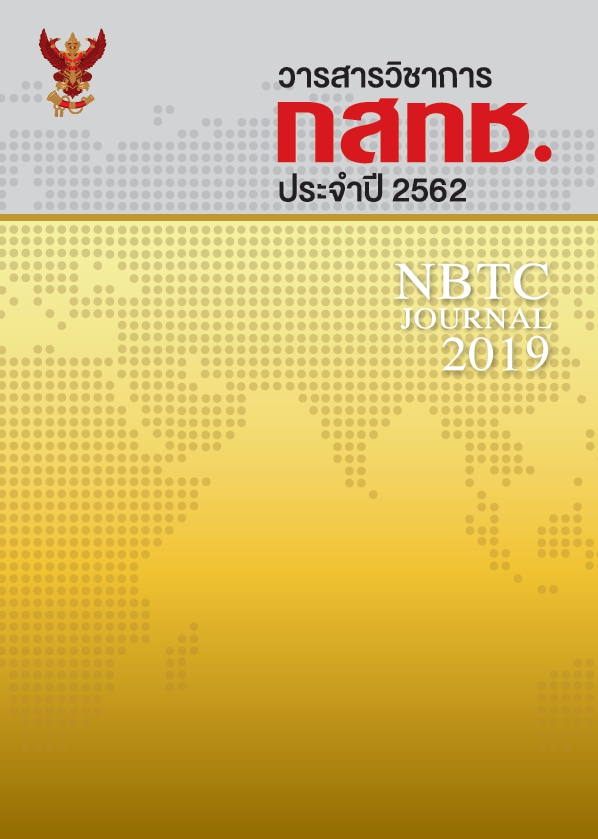Moving toward High Performance Organization of the Office of NBTC through Thailand Quality Award : TQA
Keywords:
Thailand Quality Award-TQA, Office of the NBTC, Management tool, Key processAbstract
This article aims to study conceptual framework of modern management tools to which it can be suitable deployed for the NBTC Office. The study focuses on qualitative analysis of Thailand Quality Award- TQA and used documentary research. Its results reveal that TQA, as a modern management tools, is widely recognized in a great number of countries. Those in private sector that awarded TQA are accepted as highly performance corporations. More importantly, TQA also plays a virtual role as a basis of performance appraisal system like PMQA and SEPA for government and government-related agencies, as well as state-enterprises accordingly. TQA is a guideline for seeking excellence in all aspects. In the end, it can help the organization achieve its vision and support the1st 20-year Thailand National Strategic Plan, through enhancing the government’s and government-related agencies management system. TQA help improve productivity and re-shape work systems within the organization to better functions. It is really challenging for the NBTC Office to take part in playing a significant role in moving the country towards digital Thailand. In addition, TQA is flexible enough to work well with other managerial tools. The core principle of TQA lies on an organization assessment in all aspects in order to find out whether the organization performs well as compared to the benchmark. What indicators present? Whether or not any things should be changed? How to do? And when implementing the tools, success factors should be concerned, also structure of the operational team, and assessment method to be deployed.
References
คณะแพทยศาสตร์ศิริราชพยาบาล.(2558) Lean Management for High Performance Organization. สืบค้น 20 กันยายน 2561
จาก https://www1.si.mahidol.ac.th/km/sites/default/files/u11/Fair2558_Lean2.pdf
ฉัตรชนก จรัสวิญญูและคณะ. (2557). การพัฒนาตัวแบบกระบวนการเพื่อการดำเนินการตามเกณฑ์รางวัลคุณภาพแห่งชาติ(TQA).
สืบค้น 5 กันยายน 2561,จาก https://www.tci-thaijo.org/index.php/BECJournal/article/view/54895/45562
ปวลิน โปษยานนท์. (2557). การพัฒนารูปแบบเชิงโครงสร้างองค์กรที่มีสมรรถนะสูงของบริษัท ปูนซีเมนต์ไทย (แก่งคอย) จำกัด.
วารสารการเมืองการบริหารและกฎหมาย มหาวิทยาลัยบูรพา. สืบค้น 15 กันยายน 2561, จาก https://www.tci-thaijo.org/
มณฑลี ศาสนนันทน์ และสิดาพร สายแสงจันทร์. (2552). ปัจจัยสู่ความสำเร็จในการประยุกต์ใช้ระบบบริหารคุณภาพทั่วทั้งองค์กร
(TQM) ในองค์กรที่ได้รับรางวัลคุณภาพแห่งชาติ. วารสารวิทยาศาสตร์และเทคโนโลยี มหาวิทยาลัยธรรมศาสตร์.สืบค้น 5
กันยายน 2561,จาก https://www.tci-thaijo.org/index.php/tstj/article/view/15012/13770
สถาบันเพิ่มผลผลิตแห่งชาติ. (2557). เอกสารประกอบการอบรม เรื่อง”TQA Criteria.”(วันที่ 23 ธันวาคม 2557),
กรุงเทพฯ : สถาบันเพิ่มผลผลิตแห่งชาติ.
สถาบันเพิ่มผลผลิตแห่งชาติ. (2560). เกณฑ์รางวัลคุณภาพแห่งชาติปี 2561 – 2562 กรุงเทพฯ : สถาบันเพิ่มผลผลิตแห่งชาติ
สถาบันวิจัยวิทยาศาสตร์สาธารณสุข. (2561). การบูรณาการระบบคุณภาพISO9001:2015และPMQA. สืบค้น 22 สิงหาคม 2561
จาก https://nih.dmsc.moph.go.th/data/data/60/4_2_60/ISO_PMQA.pdf
Deloitte Touche Tohmatsu Jaiyos Advisory Co., Ltd.(2018) Organization Transformation Factors for Disruptive
Technology. Retrieved September 7, 2018 ,from https://www.opdc.go.th/e
register/01/files/01_OPDC%20Organization%20Transformation%20v101%20VC.pdf
Gary Flood. (2018). Government CIO priorities in 2018, says Gartner: cloud, cybersecurity, and analytics. Retrieved
September 7,2018 ,from https://www.thinkdigitalpartners.com/news/2018/01/23/government-cio-priorities-2018-
says-gartner-cloud-cybersecurity-analytics/
Downloads
Published
How to Cite
Issue
Section
License
The Office of the NBTC holds the copyright of articles appearing in the journal. The Office of the NBTC allows the public or individuals to distribute, copy, or republish the work under a Creative Commons license (CC), with attribution (BY), No Derivatives (ND) and NonCommercial (NC); unless written permission is received from the Office of the NBTC.
Text, tables, and figures that appear in articles accepted for publication in this journal are personal opinion and responsibility of the author, and not binding on the NBTC and the Office of the NBTC. In case of errors, each author is solely responsible for their own article, and not concerning the NBTC and the NBTC Office in any way.



